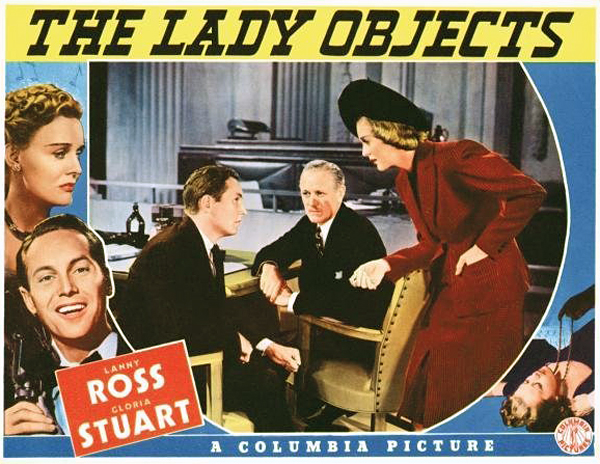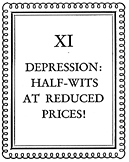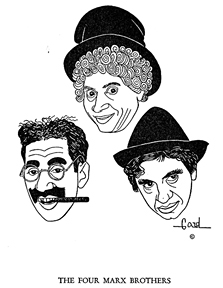Here are 10 things you should know about Jack Oakie, born 119 years ago today. The prolific Oakie was a go-to character actor for comedic second banana roles.
Tag: Jack Oakie
10 Things You Should Know About Toby Wing
Here are 10 things you should know about Toby Wing, born 105 years ago today. She was never a star, but she’s remembered fondly by old-movie buffs for her many memorable small parts and cameos.
Flirting with the Past
Last night we watched The Lady Objects (1938), a strange and kind of silly drama/musical (drusical?) that finds Gloria Stuart, adorable as ever, playing a hotshot lawyer whose husband (Lanny Ross), a former All-American halfback, a world-class tenor and a hopeful young architect (quite the trifecta, that), resents her success and the demands it places on her time.

As we said, kind of silly, but entertaining enough, since we get a special kick out of watching any picture that features Ms. Stuart. We were pleased to do a telephone interview with her some years ago when her memoir was published, and we’ll admit to being not a little proud that when we got to meet her in person a few weeks later at her book party in NYC, she flirted with us just the slightest bit. Nothing overt, nothing untoward, but in a room filled almost entirely with the young women of the publishing industry, we stood out, it seems—a young(ish—we were 41 at the time) man who was thrilled to dote on Ms. Stuart, bringing her food and drink, asking her questions about her movie career back in the 1930s and generally behaving in starstruck fashion.
So whenever we see her looking so fetching on the screen, we can’t help but think, That gorgeous movie star once flirted with us, an actress who might have once flirted with Humphrey Bogart, The Marx Brothers, James Cagney, Lee Tracy, Melvyn Douglas, Boris Karloff, Ralph Bellamy, Pat O’Brien, Eddie Cantor, John Boles, Claude Rains, Lionel Atwell, Frank Morgan, Brian Donlevy, Warner Baxter, Dick Powell, Frank McHugh, Don Ameche, Lyle Talbot, George Sanders, Walter Pidgeon, Jack Oakie, and Richard Dix. In any case, she appeared in pictures with each of them (except Bogart and the Marx Brothers, whom she knew socially).
Yes, our brief encounter with Ms. Stuart came more than a half-century after those hypothetical Hollywood flirtations—she was 89 at the time—but if she batted her eyelashes at even one-tenth of her aforementioned costars back in the day, we’d have to say we’re in pretty good company!
Snapshot in Prose: Gordon & Revel
Though he would go on to work with other composers (and have his songs be nominated for the best original song Oscar nine times), Mack Gordon spent the 1930s paired with English pianist and composer Harry Revel. The duo were very successful indeed, penning a string of popular songs that included “Underneath the Harlem Moon,” “College Rhythm,” and our personal favorite Gordon-Revel tune, “Did You Ever See a Dream Walking?”
This Snapshot in Prose captures the pair in 1934, at the height of their shared success. Read to the end of the piece, and you’ll find some of our favorite renditions of a few Gordon-Revel compositions.


In Your Hat, pt. 11



